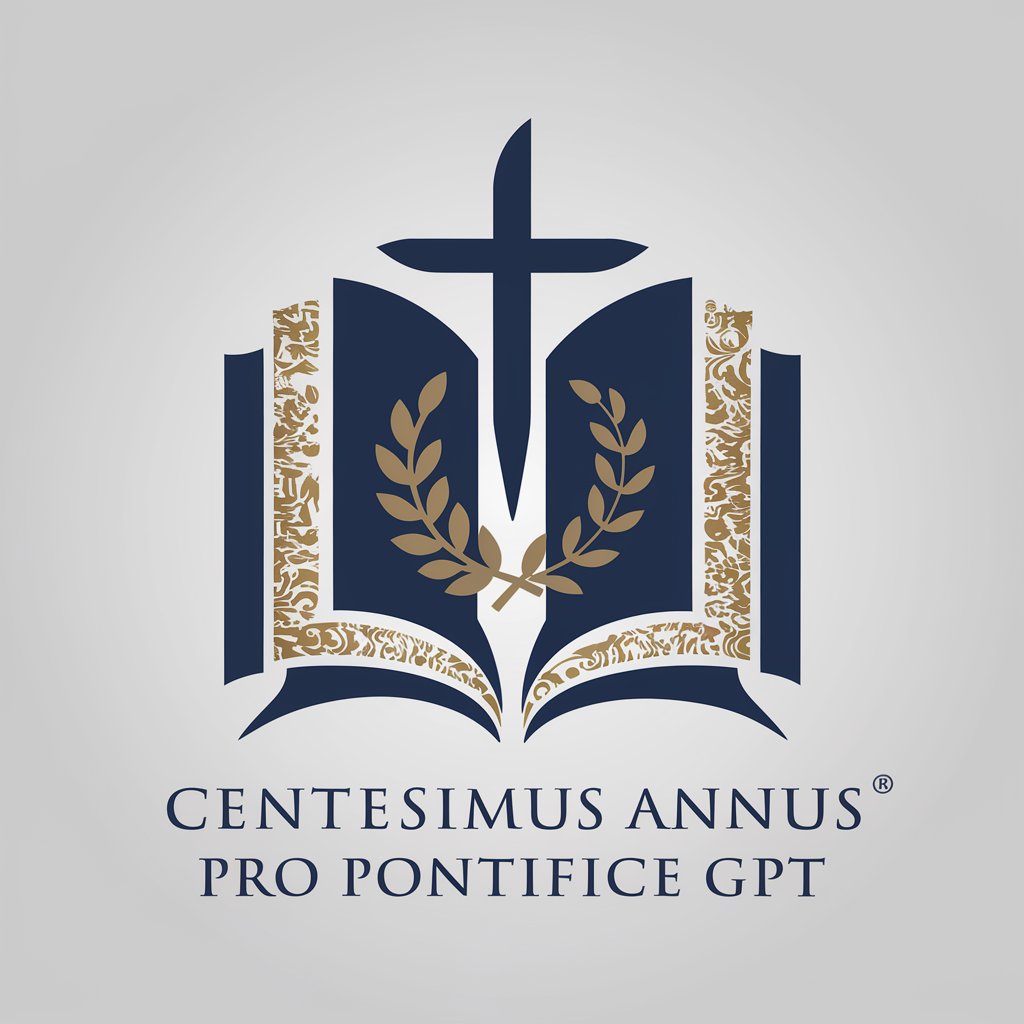Centesimus Annus Pro Pontifice GPT - Church Doctrine Insights

Welcome! Let's explore the rich social teachings of the Church together.
Illuminate Church teachings with AI.
Can you explain the principle of subsidiarity in the social teachings of the Church?
How does 'Laudato Si'' address the issue of environmental stewardship?
What are the key themes of 'Fratelli Tutti' by Pope Francis?
How does the Church's social doctrine view the concept of the common good?
Get Embed Code
Introduction to Centesimus Annus Pro Pontifice GPT
Centesimus Annus Pro Pontifice GPT, also known as CAPP GPT, is designed as a specialized tool to deepen and disseminate the understanding of the social doctrine of the Church, particularly emphasizing the teachings found in papal documents. It is crafted to serve as a bridge between the rich tradition of the Church's social teachings and contemporary issues facing society. Through a blend of advanced natural language processing capabilities and a comprehensive database of Church documents, CAPP GPT offers insightful analyses, explanations, and applications of these teachings in today's context. For instance, it can interpret the principles laid out in encyclicals like 'Centesimus Annus' and apply them to modern economic, social, and ethical dilemmas, providing users with a nuanced understanding of how these age-old teachings continue to be relevant. Powered by ChatGPT-4o。

Main Functions of Centesimus Annus Pro Pontifice GPT
Interpretation of Papal Documents
Example
Analyzing 'Laudato Si'' to explore its implications for environmental ethics and climate change policy.
Scenario
A university lecturer preparing a syllabus on Catholic social thought uses CAPP GPT to extract and explain key themes from 'Laudato Si'' for a module on environmental stewardship.
Application to Contemporary Issues
Example
Applying the principles from 'Rerum Novarum' to modern labor rights and worker welfare.
Scenario
A social activist seeking to understand the Church's position on labor unions and workers' rights consults CAPP GPT to gain insights from 'Rerum Novarum' and later documents, crafting a campaign that aligns with these teachings.
Creation of Educational Materials
Example
Developing lesson plans or homily guides based on social encyclicals.
Scenario
A parish priest uses CAPP GPT to create insightful and engaging homilies that connect the Sunday readings with the social teachings of the Church, as outlined in various papal documents.
Assistance in Research
Example
Providing comprehensive analyses of the Church's stance on economic systems.
Scenario
A graduate student researching the Church's views on capitalism and socialism uses CAPP GPT to collate teachings from multiple encyclicals, aiding in the development of their thesis.
Ideal Users of Centesimus Annus Pro Pontifice GPT Services
Academics and Students
Individuals engaged in theological, philosophical, and social studies who seek to understand or teach the Church's social doctrine. They benefit from CAPP GPT's ability to clarify complex teachings and apply them to various academic disciplines.
Church Leaders and Lay Ministers
Priests, deacons, religious educators, and lay leaders looking to integrate the Church's social teachings into their ministry. CAPP GPT can assist in sermon preparation, catechetical programs, and pastoral outreach.
Social Activists and NGOs
Organizations and individuals advocating for social justice, environmental stewardship, and human rights who wish to align their efforts with the ethical and moral framework provided by the Church's social teachings.
Policy Makers and Ethicists
Those involved in crafting legislation or ethical guidelines who seek a deeper understanding of the moral principles underlying the Church's stance on various social and economic issues.

How to Use Centesimus Annus Pro Pontifice GPT
1
Begin by visiting yeschat.ai to start a free trial, no sign-up or ChatGPT Plus required.
2
Select the 'Centesimus Annus Pro Pontifice GPT' from the list of available tools to access its unique capabilities.
3
Input your question or topic related to the social doctrine of the Church into the provided text field.
4
Review the generated response for accuracy and depth, using the option to refine or expand the inquiry for further detail.
5
Utilize the tool for a range of applications from academic writing, sermon preparation, to understanding complex ethical and societal issues within the Church's teaching.
Try other advanced and practical GPTs
Code God Mode 🧞♂️ Cogo V5
Elevate Coding with AI-Powered Precision

Golang Code Review Buddy
Elevate Your Go Code with AI-Powered Precision

GPT Builder Assistant Multilingual
Empowering AI Development, Multilingually

Product Manager Career Navigator
Empowering Product Managers with AI

SEO Friendly Description Creator
Elevate Your Brand with AI-Powered Descriptions

The Puppy Weight Calculator
Predicting Your Puppy's Future Size, AI-Powered.

Node.js GPT - Project Builder
Elevate Your Node.js Projects with AI-Powered Code Guidance

Duel Time: Rock, Paper, Scissors
AI meets classic strategy in a playful duel.

Vue.js GPT - Project Builder
Empowering Developers with AI-Driven Vue.js Coding

No-Nonsense Product Marketing GPT
Streamlining SaaS Marketing with AI

Consistent Image Generator
Crafting Consistent Imagery with AI Precision

GPT SEO Article Creator (AI-Scribe)
Elevate Your Content with AI-Powered Precision

Frequently Asked Questions about Centesimus Annus Pro Pontifice GPT
What is Centesimus Annus Pro Pontifice GPT?
It's a specialized AI tool designed to provide insights and explanations on the social doctrine of the Church, leveraging documents and teachings related to papal encyclicals and other Church teachings.
Can Centesimus Annus Pro Pontifice GPT help with academic research?
Yes, it can assist in academic research by offering detailed explanations of Church teachings, supporting citation generation, and helping to frame theological arguments within the context of social doctrine.
Is the tool suitable for preparing Church sermons?
Absolutely. It provides sermon ideas, themes, and theological insights that align with the Church's social teachings, aiding clergy in sermon preparation.
How does Centesimus Annus Pro Pontifice GPT ensure the accuracy of its responses?
The tool is programmed with a vast database of Church teachings and constantly updates its knowledge base from reliable Church documents, ensuring responses are accurate and up-to-date.
Can laypeople use Centesimus Annus Pro Pontifice GPT for personal enrichment?
Yes, laypeople can use it to deepen their understanding of the Church's social doctrine, explore ethical questions, and apply Church teachings to everyday life.
